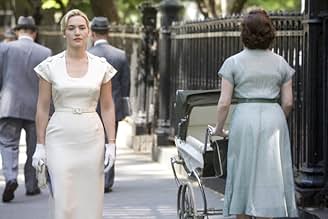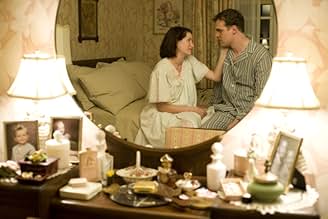A young couple living in a Connecticut suburb during the mid-1950s struggle to come to terms with their personal problems while trying to raise their two children.A young couple living in a Connecticut suburb during the mid-1950s struggle to come to terms with their personal problems while trying to raise their two children.A young couple living in a Connecticut suburb during the mid-1950s struggle to come to terms with their personal problems while trying to raise their two children.
- Nominated for 3 Oscars
- 20 wins & 73 nominations total
Joe Komara
- Party Dancer
- (as Joe Kamara)
- Director
- Writers
- All cast & crew
- Production, box office & more at IMDbPro
Storyline
Did you know
- TriviaWhile directing the love scene between Leonardo DiCaprio and Kate Winslet, director Sir Sam Mendes, Winslet's then-husband, opted to watch the monitor from another room. Mendes admitted that directing his own wife in a sex scene was awkward, but added that directing sex scenes are always awkward. Winslet found this very uncomfortable. "Leo's my best friend, Sam's my husband, this is a bit weird!" However, DiCaprio found it very easy, as "we've done this a thousand times before", while filming Titanic (1997).
- GoofsWhen April shows Paris on the globe, the borders of the European countries are current. Most notably, the reunified Germany is visible, with the borders it did not have until 1990.
- Quotes
April Wheeler: Tell me the truth, Frank, remember that? We used to live by it. And you know what's so good about the truth? Everyone knows what it is however long they've lived without it. No one forgets the truth, Frank, they just get better at lying.
- Crazy creditsIn the end credits, there are six for songs where no individual is mentioned, just the group name. Of the six, five read "Performed by," followed by the name of the group. One, "Performed The King Cole Trio." incorrectly omits the adverb "by." It should be "Performed BY [my emphasis] The King Cole Trio."
- ConnectionsFeatured in At the Movies: Summer Special 2008/09 (2008)
- SoundtracksThe Gypsy
Written by Billy Reid
Performed by The Ink Spots
Courtesy of Geffen Records
Under license from Universal Music Enterprises
Featured review
Life is what happens to you while you're busy making other plans
Leonard DiCaprio and Kate Winslet star in "Revolutionary Road," a 2008 film directed by Sam Mendes. The film also features Kathy Bates and John Givings.
It's 1955. Frank and April Wheeler have been married seven years, live in the Connecticut suburb and have two children. Frank works for a company that his father worked for, and he hates his job. April is a stay-at-home mom who wanted to be an actress.
While it might look good on the outside, this isn't the life either one envisioned. But April has an idea. They have enough money saved so that they can move to Paris, a city Frank loves. She can get a job as a secretary, which pays very well over there, and Frank can stay at home and decide what he really wants to do with his life. It sounds possible but maybe not practical, though Frank ultimately agrees to it.
Frank can't seem to find the right moment to give his notice; and then April discovers that she is pregnant. What now? There are lots of layers in this emotionally resonant, magnificently acted film. It's very much a story of its time for several reasons. The first is that it's obvious that April suffers from very bad depression. Though post-war psychological problems were recognized, actual depression, especially in a woman, probably wasn't given much attention. It was the returning soldiers who had suffered trauma who had the psychiatric focus. If by some means she had been discovered to have clinical depression, the medicine was horrible.
The second thing is that it was 1955. The ideas of picking up and moving to Europe with your family and the woman as breadwinner were outrageous back then. Now, not so much.
The third reason is that April at least had an artist's mentality and an artist's way of looking at the world. In this world, we have the practical and the artist, as in the O'Neill play Beyond the Horizon, where one brother is a farmer and the other brother is a poet who dreams of going out to sea. The problem is, there's no way to kill those attributes, and if you try, you won't be happy. April shouldn't have been married, shouldn't have been living in the suburbs, and shouldn't have stayed home.
Frank is more practical, though he'd like to be different, would like to do something he loves, if only he knew what that was. April thought he was cosmopolitan, adventurous, and that together, they'd be special. The idea that they're not special is something she can't tolerate.
This is such a fascinating movie about life's disappointments, punctuated with some humor by Kathy Bates as Mrs. Givings, a loquacious woman, whose son (Michael Shannon) has been institutionalized. When he meets the Wheelers, he has an uncanny way of speaking exactly the truth no one wants to hear. Shannon does a fantastic job in these disturbing scenes.
A shattering movie. I like to be entertained in films. I feel like we all have so much to reality to face, why not be able to turn away from it - but a beautifully realized film like this about dysfunction - somehow, I don't mind.
It's 1955. Frank and April Wheeler have been married seven years, live in the Connecticut suburb and have two children. Frank works for a company that his father worked for, and he hates his job. April is a stay-at-home mom who wanted to be an actress.
While it might look good on the outside, this isn't the life either one envisioned. But April has an idea. They have enough money saved so that they can move to Paris, a city Frank loves. She can get a job as a secretary, which pays very well over there, and Frank can stay at home and decide what he really wants to do with his life. It sounds possible but maybe not practical, though Frank ultimately agrees to it.
Frank can't seem to find the right moment to give his notice; and then April discovers that she is pregnant. What now? There are lots of layers in this emotionally resonant, magnificently acted film. It's very much a story of its time for several reasons. The first is that it's obvious that April suffers from very bad depression. Though post-war psychological problems were recognized, actual depression, especially in a woman, probably wasn't given much attention. It was the returning soldiers who had suffered trauma who had the psychiatric focus. If by some means she had been discovered to have clinical depression, the medicine was horrible.
The second thing is that it was 1955. The ideas of picking up and moving to Europe with your family and the woman as breadwinner were outrageous back then. Now, not so much.
The third reason is that April at least had an artist's mentality and an artist's way of looking at the world. In this world, we have the practical and the artist, as in the O'Neill play Beyond the Horizon, where one brother is a farmer and the other brother is a poet who dreams of going out to sea. The problem is, there's no way to kill those attributes, and if you try, you won't be happy. April shouldn't have been married, shouldn't have been living in the suburbs, and shouldn't have stayed home.
Frank is more practical, though he'd like to be different, would like to do something he loves, if only he knew what that was. April thought he was cosmopolitan, adventurous, and that together, they'd be special. The idea that they're not special is something she can't tolerate.
This is such a fascinating movie about life's disappointments, punctuated with some humor by Kathy Bates as Mrs. Givings, a loquacious woman, whose son (Michael Shannon) has been institutionalized. When he meets the Wheelers, he has an uncanny way of speaking exactly the truth no one wants to hear. Shannon does a fantastic job in these disturbing scenes.
A shattering movie. I like to be entertained in films. I feel like we all have so much to reality to face, why not be able to turn away from it - but a beautifully realized film like this about dysfunction - somehow, I don't mind.
- How long is Revolutionary Road?Powered by Alexa
Details
Box office
- Budget
- $35,000,000 (estimated)
- Gross US & Canada
- $22,911,480
- Opening weekend US & Canada
- $189,911
- Dec 28, 2008
- Gross worldwide
- $75,981,180
- Runtime1 hour 59 minutes
- Color
- Sound mix
- Aspect ratio
- 2.35 : 1
Contribute to this page
Suggest an edit or add missing content






























